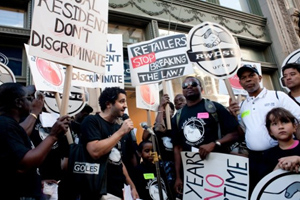NYC Retail Workers Win Settlement, Look to Fight for Living Wage

Working a low-wage retail job in New York City isn’t easy, but for people like Romeo Ilboudou, a stock manager at the high-end clothing retailer Scoop NYC, discrimination, wage theft, and hazardous conditions made it even lousier.
“The stock people were all West African,” said Ilboudou, who worked the job for five years. “Our break room was a boiler room in the basement. This is where we had to eat our lunch, change our clothes and even sleep.”
Non-immigrant workers at Scoop NYC were not subject to such conditions, Ilboudou said, adding that he and other immigrants were also forced to work more than 20 hours per week overtime without receiving the legally required time-and-a-half pay.
“We are the ones who built this company from the bottom up, and this was not a way to say ‘thank you,’” he added.
Now, Ilboudou and his former co-workers are celebrating a victory that comes after a year of organizing, protest, and legal action to make the company follow wage and hour laws and respect the rights of immigrant workers.
Seventeen workers from Scoop NYC achieved a settlement for their back wage and discrimination suits July 7 with the help of the Retail, Wholesale, and Department Store Union’s Retail Action Project (RAP). Its terms are confidential.
Workers filed two complaints against Scoop NYC, one seeking hundreds of thousands of dollars in back pay for overtime and the second alleging discrimination based on national origin. Scoop NYC management attempted to skirt its responsibility to pay overtime and other benefits by misclassifying workers as managers, they said. The settlement covers both cases.
USE WHEN CONVENIENT
In October 2008 Scoop NYC initiated an internal audit of the immigrant workers’ papers. According to RAP, seven workers presented authorization, but Scoop NYC fired them, alleging that they failed to produce proper documentation.

SUPPORT LABOR NOTES
BECOME A MONTHLY DONOR
Give $10 a month or more and get our "Fight the Boss, Build the Union" T-shirt.
The fired workers turned to RAP for assistance, and then to the Cary Kane law firm.
In July 2009, RAP organized a large demonstration outside Scoop NYC’s flagship store in SoHo to announce the lawsuit against the trendy retailer. Workers marched up Broadway in February, again descending on Scoop NYC, together with RAP members from nearby boutiques.
Organizers say this settlement is not only a victory for Scoop NYC workers, but a step towards improving wages for retail workers throughout the city.
“Because many retail workers are not properly paid and many others suffer from poverty wages, not only must we ensure that legal wages are paid retail workers but we must lift the wage floor for retail workers,” said Jeff Eichler, RWDSU’s lead organizer in New York.
The union is pushing for the Wage Theft Prevention Act at the state level, which would substantially increase penalties for wage theft and provide additional protection to workers who come forward to report wage theft, and the Fair Wages for New Yorkers Act in New York City, which would require that all large subsidized projects provide a living wage of $10 per hour plus benefits for permanent workers or $11.50 an hour if health benefits are not provided. The bill would also provide for cost of living increases.
Ilboudou says the victory at Scoop NYC is not just about the money. “When you’re struggling to make ends meet and you’re moving from job to job, you really are at the mercy of the boss,” he said. “Organizing together gives us strength.”
Diane Krauthamer is a staffer with the RWDSU.





